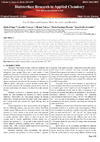Please use this identifier to cite or link to this item:
https://accedacris.ulpgc.es/jspui/handle/10553/17126
| Title: | Use of abaca and banana fibers for water purification | Authors: | Ortega, Zaida Vaswani Reboso, Jennifer Velasco, Miriam Monzón Verona, Mario Domingo González González, Juan Emilio |
UNESCO Clasification: | 3303 ingeniería y tecnología químicas 3312 Tecnología de materiales |
Keywords: | Abaca fibers Banana fibers Water purification Cu2+ Fe2+ |
Issue Date: | 2014 | Journal: | Biointerface Research in Applied Chemistry | Abstract: | Some previous researches show the potential of natural fibers for the production of filters, as these materials are commonly used in the production of tea bags or filters for tobacco. This paper focuses on the use of banana and abaca fiber for water purification, showing thus their capacity for heavy metals adsorption; on the other hand, since the filtering media used is formed by natural materials, microbiological analysis was carried out, ensuring that no organic pollution happens during the filtering process. This research has been approached with cupper and iron (Cu2+ and Fe2+), being both materials commonly used in water supply systems. Spanish regulation allows maximum levels of 2 mg/L for Cu2+ and 0.2 mg/L for Fe2+. Two types of vegetable fibers were used: banana fiber from Canary Islands and abaca fiber from Ecuador. Also different length fibers have been used, studying that way the effect of the superficial area on the adsorptive of ions on natural material. The amount of fiber used has also been varied, from 5 to 20 g per 100mL of water sample. Concentration of the metallic ions has also been modified, i.e.: 2, 4 and 6 mg/L for Cu2+ and 0.2, 0.4 and 0.6 mg/L for Fe2+. Ions were either studied separately or when both were present in concentrations mentioned above. It has been shown that both types of fiber show ability for metallic content reduction in water, without introducing microbial pollution in treated samples. | URI: | https://accedacris.ulpgc.es/handle/10553/17126 | ISSN: | 2069-5837 | Source: | Biointerface Research in Applied Chemistry [ISSN 2069-5837], v.4,(4), pp. 832-835 |
| Appears in Collections: | Artículos |
WEB OF SCIENCETM
Citations
1
checked on Feb 25, 2024
Page view(s) 1
788
checked on Jan 11, 2026
Download(s)
302
checked on Jan 11, 2026
Google ScholarTM
Check
Share
Export metadata
This item is licensed under a Creative Commons License

